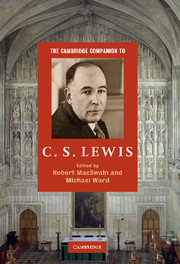5 - Classicist
from Part I - Scholar
Published online by Cambridge University Press: 28 November 2010
Summary
Classics is the study of Greek and Latin and of the literature that was written in those languages before Christianity won its ascendancy in the Roman Empire. Up to the time of Lewis's death in 1963 (and for some years after) instruction in Latin at least was mandatory in public schools. As these were the schools that fed the universities in Lewis's time, it was seldom possible and never prudent to go up to Oxford or Cambridge without some competence in the pagan tongues. Lewis, as we shall see, acquired more than a mere competence in Classics before he was admitted to University College, Oxford in 1917. The majority of colleges at Oxford and Cambridge had been founded when Latin was still the common dialect of philosophers, theologians and scientists in the great European nations; after the Reformation of the sixteenth century, Greek was considered a necessary acquirement for every minister of the gospel in the established Church of England. By the end of the nineteenth century, the more compelling arguments for the study of the classics were pedagogic and plutocratic. The pedagogic argument maintained (and not without cogency) that a knowledge of the great poets of Greece and Rome was an indispensable preparation for the study of English literature, that the ancient canon furnished a more enduring standard of excellence than any modern vernacular, and that the practice of translating into a language that did not admit of word-for-word conversion forced the student to reflect upon his own meaning and to prune his thoughts of verbiage.
- Type
- Chapter
- Information
- The Cambridge Companion to C. S. Lewis , pp. 58 - 72Publisher: Cambridge University PressPrint publication year: 2010



